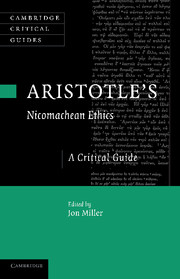Chapter 1 - On the unity of the Nicomachean Ethics
Published online by Cambridge University Press: 07 September 2011
Summary
The separate treatises composing the .
The Nicomachean Ethics (N.E.) presents itself as composed out of a relatively small number of “treatises” on topics in moral philosophy; the question of the unity of the N.E. therefore involves both the question of (i) how coherent each of these treatises is, and also (ii) how well they are knit together to form a coherent whole. Here I shall focus largely on the latter question, although this will require at times some attention to the former.
By “presents itself” I mean two things. First, I mean simply how the N.E. appears to a careful reader who has some background knowledge of how Aristotelian texts are constituted and how Aristotle worked as a philosopher. Aristotelian texts are compiled out of “books,” which correspond to the length of a scroll. This is a purely accidental matter, but in general this length is exploited by Aristotle as a unit of treatment of a subject. Longer works would be made by joining together discussions parsed according to books. Aristotle’s own philosophical tendencies fit well with this manner of composition, because his works are generally sparse in system and architectonics: in general he aims to discuss each subject initially on its own terms – almost as if in isolation – as if he is trusting that, if this is done well, then any composition of such discussions will harmonize, on the grounds that, as he says, truth harmonizes with truth (see i.7, 1098b11–12).
- Type
- Chapter
- Information
- Aristotle's Nicomachean EthicsA Critical Guide, pp. 23 - 44Publisher: Cambridge University PressPrint publication year: 2011
- 4
- Cited by



